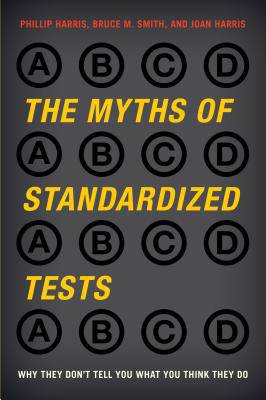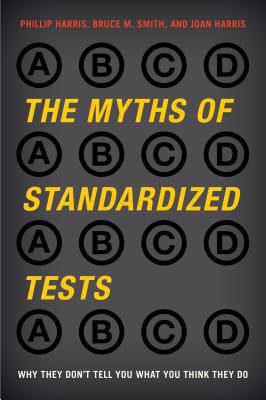
- Afhalen na 1 uur in een winkel met voorraad
- Gratis thuislevering in België vanaf € 30
- Ruim aanbod met 7 miljoen producten
- Afhalen na 1 uur in een winkel met voorraad
- Gratis thuislevering in België vanaf € 30
- Ruim aanbod met 7 miljoen producten
Zoeken
The Myths of Standardized Tests
Why They Don't Tell You What You Think They Do
Phillip Harris, Bruce M Smith, Joan Harris
Paperback | Engels
€ 33,95
+ 67 punten
Uitvoering
Omschrijving
Pundits, politicians, and business leaders continually make claims for what standardized tests can do, and those claims go largely unchallenged because they are in line with popular assumptions about what these tests can do, what the scores mean, and the psychology of human motivation. But what most of what these opinion leaders say-and the public believes-about standardized testing just isn't so. However, few members of the general public, not even concerned parents, have the time or the background to keep up with the latest findings of testing experts, psychometricians, and researchers. That's where The Myths of Standardized Tests comes in. In simple, accessible language, Harris, Smith, and Harris spell out the assumptions underlying standardized tests and point out what's true about them and what's just plain mythical. But they not only debunk common assumptions; they propose better ways to judge the success of our schools. They also offer readers suggestions for ways they can help reduce the burden of tests on their children. Appendixes offer readers contact information and suggestions for actions they can take to become part of the solution to the problem of overusing and misusing standardized tests.
Specificaties
Betrokkenen
- Auteur(s):
- Uitgeverij:
Inhoud
- Aantal bladzijden:
- 206
- Taal:
- Engels
Eigenschappen
- Productcode (EAN):
- 9780810896147
- Verschijningsdatum:
- 3/11/2017
- Uitvoering:
- Paperback
- Formaat:
- Trade paperback (VS)
- Afmetingen:
- 145 mm x 221 mm
- Gewicht:
- 340 g

Alleen bij Standaard Boekhandel
+ 67 punten op je klantenkaart van Standaard Boekhandel
Beoordelingen
We publiceren alleen reviews die voldoen aan de voorwaarden voor reviews. Bekijk onze voorwaarden voor reviews.











